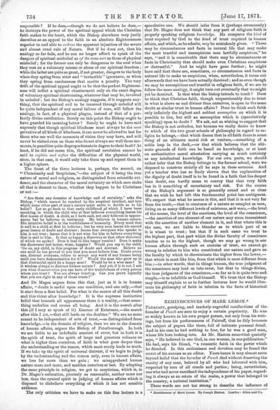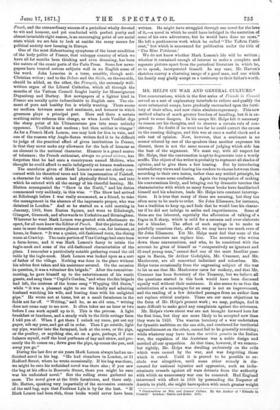REMINISCENCES OF MARK LEMON.* PLEASANT, gossiping, and tenderly-regretful recollections of
the- founder of Punch are sure to enjoy a certain popularity. He was. so widely known in his own proper person, not only from his writ- ings, but from his performances of Falstaff, that he fitly becomes- the subject of papers like these, full of intimate personal detail- And in his case he had nothing to fear, for he was a good man,. whose life bore looking into. As Mr. Hatton somewhat quaintly says, "He believed in one God, in one woman, in one publication."' He had, says his friend, "a romantic faith in the power which, he directed. In this enthusiasm and devotion may be found the of his success as an editor. Years hence it may almost seeua beyond belief that the founder of Punch died without deserving the enmity of any man, beloved by all who had laboured with him,. respected by men of all creeds and parties ; being, nevertheless,. one who had never sacrificed the independence of his paper, regard- ing it always as an estate of the realm, a power that belonged to. the country, a national institution."
These words are not too strong to describe the influence of
* Reminiscences of Mark Lemon. 537 Joseph Hatton. London : Allen and Clo.
Punch, and the extraordinary success of a periodical wholly devoted to wit and humour, and yet conducted with perfect purity and almost invariable right reason, is an encouraging point of our social 'state which we are fain to look at amidst the many causes for Folitical anxiety now looming in Europe.
One of the most disheartening symptoms of the inner condition -of the body politic of France, that unhappy country of which we have all for months been thinking and even dreaming, has been the nature of the comic parts of the Paris Press. Some few news- papers have treated serious subjects well in an English sense of the word. John Lemoine is a terse, sensible, though anti- Christian writer ; and to the Debats and the Siècle, on the one side, ehould be added, on the other, the Francais, the extremely well- written organ of the Liberal Catholics, which all through the (months of the Vatican Council fought lustily for Monseigneurs ,Dupanloup and Darboy. But newspapers of a lighter kind in France are usually quite indescribable to English ears. The ele- raent of pure and healthy fun is wholly wanting. There seems 110 medium between sense and sentiment, and humour in which grossness plays a principal part. Here and there a certain scathing satire redeems this charge, as when Louis Veuillot digs the sharp point of his Ultramontane pen into some unlucky -opponent. Veuillot is not unclean ; but then neither is vinegar ! As for a French Mark Lemon, one may look for him in vain, and -one of the reasons why Anglo-Saxon writers find it to be difficult to judge of the practical effect of given institutions in France, is that they never make any allowance for the lack of humour as an element in the national character. Humour is a grand source -of tolerance; the French enthusiast, always au grand serieux, has forgotten that he had once a countryman named Moliere, who thought he could afford to smile indulgently at human weaknesses.
The anecdotes given of Mark 'Lemon's career are chiefly con- -corned with his theatrical tours and his impersonation of Falstaff, a character for which nature had physically fitted him, and into which he entered with all the energy of his cheerful bearing. Mr. Hatton accompanied the "Show in the North," and his duties 'commenced very suddenly, in this wise. "The Show had arrived at Edinburgh before I was really summoned, as a friend, to take the management in the absence of the impresario proper, who was -detained in London." And so he started on a cold morning in -January, 1869, from Euston Square, and went to Edinburgh, Glasgow, Greenock, and afterwards to Yorkshire and Birmingham. Wherever he went Mark Lemon was greeted with affectionate re- spect, for all men knew the Editor of Punch. But the picture of the man in more domestic scenes pleases us better, —as, for instance, at (home, in Sussex. "It was a quaint, old-fashioned room, the dining -room at Crawley. The main portion of Vine Cottage had once been a. farm-house, and it was Mark Lemon's fancy to retain the ingle-nook and some of the old-fashioned characteristics of the place. I remember a particularly notable gathering round the old table by the ingle-nook. Mark Lemon was looked upon as a sort -of father of the village. Nothing was done in the place without his advice first taken and his assistance secured. On the occasion in question, it was a volunteer fire brigade." After the committee- meeting, he gave himself up to the entertainment of his rustic _guests, and sang them "Cupid's Garden," and when the fire brigade had left, the mistress of the house sang "Wapping Old Stairs," while "it was a pleasant sight to see the kindly and admiring 'husband watching his wife, and beating time with his unlighted pipe." He wrote not at home, but at a small farmhouse in the sfields not far off. "Writing," said he, as an old man, "writing -does not come easy to me now. It often takes me an hour or two 'before I can work myself up to it. This is the process. A light freakiest or luncheon, and a steady walk to the little cottage farm I told you of. When I get there I unlock my room, put out my paper, nib my pens, and get all in order. Then I go outside, light ray pipe, wander into the farmyard, look at the cows, or the pigs, -or the poultry, or anything else, sit on a gate, perhaps, if I can balance myself, sniff the local perfumes of hay and straw, and pre- sently the fit comes on ; down goes the pipe, up comes the pen, and -away you go."
During the last five or six years Mark Lemon always had an mi- nished novel in his bag. "He had chambers in London, at 31 Bedford Street, where he wrote occasionally. If his bag was there, we might be sure his unfinished novel was there also ; if you saw the bag at his office in Bouverie Street, there you might be sure was his unfinished novel." But the rolling stone gathered no ,moss. The novel grew at the little farmhouse, and there only. Mr. Hatton, speaking very impartially of the successive contents -of the said bag, says that Faulkner Lyle is by far the best. "If Mark Lemon had been rich, these books would never have been
Written. He might have struggled through one novel for the love of it,—a novel in which he could have indulged in the narration of some of his own adventures, but he would have done no more." He left a posthumous work which he called "The Taffeta Petti- coat," but which is announced for publication under the title of
The Blue Petticoat.'
We do not know whether Mark Lemon's life will be written ; whether it contained enough of interest to make a complete and separate picture apart from the periodical literature in which he, so to speak, incorporated himself. In any case, Mr. Hatton'a sketches convey a charming image of a good man, and one which his family may gladly accept as a testimony to their father's worth.



































 Previous page
Previous page